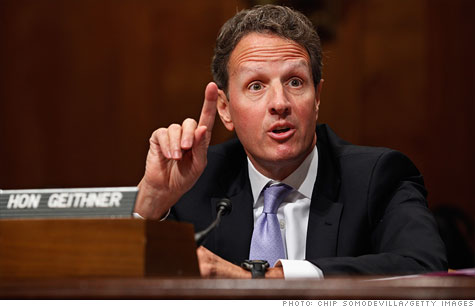Search News

Treasury Secretary Tim Geithner told lawmakers that the debt ceiling likely won't be reached until "until quite late in the year." Some say it could be sooner.
NEW YORK (CNNMoney) -- Remember the bitter debt ceiling debate in Washington last summer? The one that resulted in the first-ever downgrade of the U.S. credit rating?
Well, another showdown could be in the offing sooner than planned.
The deal cut this summer to end the debt ceiling standoff provided for a $2.1 trillion increase in the country's legal borrowing limit, which now stands at $16.394 trillion.
At the time, it was estimated that such an increase could carry the Treasury Department safely beyond the contentious presidential election season and into early 2013.
But now that Congress has extended the payroll tax cut, emergency unemployment benefits and the so-called Medicare doc fix -- only some of which was paid for -- there is a greater chance that U.S. borrowing could reach the debt ceiling sooner.
Treasury Secretary Tim Geithner recently told lawmakers that even with passage of the payroll tax bill -- which will add an estimated $101 billion to deficits in fiscal year 2012 -- he doesn't expect the debt limit to be reached "until quite late in the year."
That's a hair past the Nov. 6 election but smack dab in the middle of the fiscal firefight that Congress is expected to have over the expiring Bush tax cuts.
Meanwhile, the Bipartisan Policy Center, which analyzed projected monthly deficits and other factors that could play a role in Treasury's borrowing, now projects that the debt ceiling could be hit between late November 2012 and early January 2013.
Of course, if need be, the Center notes that Treasury could still avert a U.S. default by employing "extraordinary measures" -- such as suspending investments in federal retirement funds.
So even if Treasury is at risk of hitting the ceiling at the end of November, it's possible that its moves could take the risk of default off the table until early 2013.
Keep in mind, though, that these estimates assume nothing material changes between now and the end of the year to increase federal borrowing.
But if there are any surprises along the way -- such as a slowdown in the economic recovery that puts a crimp in federal revenue, or more unpaid-for legislation -- the debt ceiling could be hit before Election Day, said longtime political observer Norm Ornstein, a resident fellow at the American Enterprise Institute.
Either way, the presidential election, the pending expiration of the Bush tax cuts and the debt ceiling are a combustible mix. And it's impossible to predict the endgame for any of them yet. Much will depend on when the ceiling is breached and who wins the election, Ornstein said.
For example, he noted, if President Obama loses the election, he may still have a strong hand to play in the debt ceiling negotiations, since it's unlikely that the Republican incumbent will want his first task in office to be rounding up votes for a debt ceiling increase, especially if he campaigned against it. ![]()
| Overnight Avg Rate | Latest | Change | Last Week |
|---|---|---|---|
| 30 yr fixed | 3.80% | 3.88% | |
| 15 yr fixed | 3.20% | 3.23% | |
| 5/1 ARM | 3.84% | 3.88% | |
| 30 yr refi | 3.82% | 3.93% | |
| 15 yr refi | 3.20% | 3.23% |
Today's featured rates:
| Latest Report | Next Update |
|---|---|
| Home prices | Aug 28 |
| Consumer confidence | Aug 28 |
| GDP | Aug 29 |
| Manufacturing (ISM) | Sept 4 |
| Jobs | Sept 7 |
| Inflation (CPI) | Sept 14 |
| Retail sales | Sept 14 |